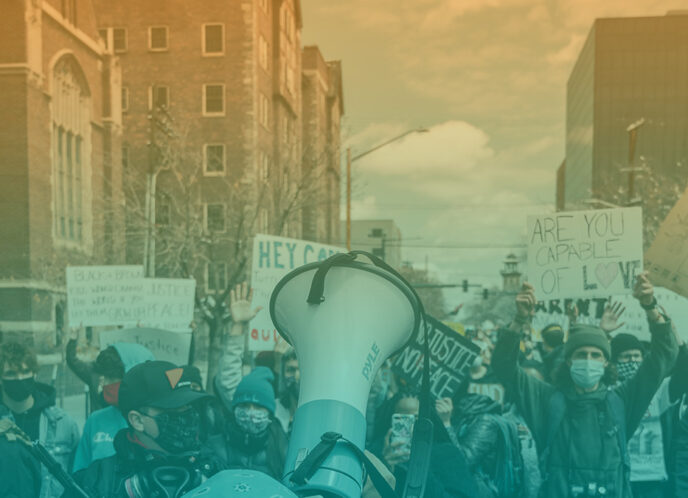Groups say Sen. Duckworth’s new bill would protect the families of people who are incarcerated and ensure successful reentries
Contact: Imran Siddiquee, MediaJustice, [email protected], 510.698.3800 x 403
Washington D.C. — Advocates for prison phone justice applauded Senator Tammy Duckworth’s introduction of bipartisan new legislation today that would restore the FCC’s authority to regulate intrastate prison phone rates and fees. Groups working for racial, economic, and gender justice, including MediaJustice and members of the MediaJustice Network, emphasized that The Martha Wright-Reed Just and Reasonable Communications Act of 2019 (S.1764) is the result of years of grassroots organizing nationwide, including by those directly impacted by the high cost of prison phone calls.
“When your loved one is incarcerated, it can feel like you’re doing time with them. During this time, you are trying to navigate how to keep your family and relationships together and the primary way to do this is through prison phone calls. For prison phone companies to exploit the most important resource families have to support their incarcerated loved ones is cruel,” said Myaisha Hayes, National Organizer on Criminal Justice & Technology at MediaJustice. “We need the FCC to step in and regulate the prison phone industry to protect families.”
The bill is named in honor of Mrs. Martha-Wright Reed, a Black woman who fought for affordable prison phone rates for over 20 years to remain in contact with her incarcerated grandson. Because of Wright-Reed’s perseverance, in 2013, the FCC finally capped the rates for interstate (long distance, out of state) prison phone calls to 21 cents per minute from both prison and jails. However, when prison phone companies sued, the U.S. Court of Appeals for the D.C. Circuit ruled that the FCC did not have the jurisdiction to regulate intrastate prison phone calls. Today’s newly introduced legislation, cosponsored by Sens. Portman, Schatz, Booker, King and Markey, would address this court decision by restoring the FCC’s authority to regulate these calls.
“Friends and families of prisoners have been waiting far too long for freedom from inflated prices and unnecessary kickbacks. A call to a loved one in a correctional facility should cost what it costs to provide the telephone connection, no more and no less,” added Tracy Rosenberg, Executive Director of Media Alliance. “Funding prisons on the backs of inmate families through huge commissions is heaping yet more stress on connections already strained by incarceration. It’s cruel and it’s counterproductive, as connections to loved ones outside are a key factor in preventing returns to jail after release. It is time for an end to prison phone injustice and for fair and humane rates for prison phone calls.”
Ulandis Forte (grandson of Mrs. Martha Wright-Reed) and several members of the MediaJustice Network—including MediaJustice, Media Alliance, Ella Baker Center for Human Rights, Moms Rising, Urbana-Champaign Independent Media Center, Generation Justice and Voices for Racial Justice—will be represented on Wednesday at an FCC oversight hearing in the Senate Commerce Committee, where the new bill will be discussed.
The following quotes were additionally provided by members of the MediaJustice Network and other prison phone justice advocates:
Ulandis Forte, grandson of Mrs. Martha Wright-Reed, said: “My grandmother, Mrs. Martha Wright-Reed will always be one of the strongest women I’ve ever known. For 18 years she stood by my side throughout my entire incarceration and endured the uncomfortable ongoing struggle of being forced to choose what was more important—family or medication. Too many times my grandmother elected to choose her love for me and paying the ridiculous overpriced prison phone calls over her own much-needed medications to survive in order to keep our relationship alive. She would do without, just to keep our communication going. Far too many families have been broken, bonds lost, children suffered, all from the ferocious greed of phone companies taking total advantage of someone’s mishap or shortcomings. It’s so inhumane for anyone to turn their backs on an obvious problem because it doesn’t affect their family. As long as I’m alive I will do all I can to expose the wrongdoings of phone companies that are wickedly exploiting the turmoil so many families face over the greed of the all mighty dollar.”
Cheryl Leanza, Managing Director at the United Church of Christ: “Sen. Duckworth’s Martha Wright-Reed Just & Reasonable Communication Act is an important step to ensure that all consumers are treated fairly, including consumers who communicate with incarcerated people. Ms. Wright-Reed was an inspiration in her quest to support her grandson. When this bill becomes law, it will ensure that phone companies serving incarcerating institutions do not hold their customers hostage with predatory rates, outrageous fees and unjust practices. As Christians, the United Church of Christ’s media justice ministry finds inspiration in Matthew 25—we often visit people in prison today via modern communications and no one should be gouged in their efforts to do so.”
Emily Harris, Policy Manager, Ella Baker Center: “The Ella Baker Center for Human Rights supports the Martha Wright-Reed Justice and Reasonable Communications Act of 2019. We know it’s time to stop the telecommunications companies from making billions on the backs of poor families, often single Black women, who have a loved one in prison. Through our collaborative research for the 2014 “Who Pays?” report, we found that 1 in 3 families have gone into debt to cover phone and visitation costs alone. It benefits us all when families are able to stay in touch and support their incarcerated loved ones without the added trauma of going broke.”
Brian Dolinar, Illinois Prison Phone Justice, based at the Urbana-Champaign Independent Media Center: “The Prison Phone Justice Bill is needed to bring relief to families who have been paying outrageous rates for too long. We should not make the poorest families pay for the costs of mass incarceration. More regular phone communications mean stronger families and healthier communities.”
Monifa Bandele, Senior Vice President, Moms Rising: “We applaud the courage and leadership of the Prison Phone Justice Campaign for uplifting the Inmate Calling Technical Corrections Act. American families already have to bear the burden of dealing with loved ones who are incarcerated, adding financial responsibilities on top of these burdens is inhumane. The current policy in place not only puts a high price on poverty, it heightens family separation and puts families further in debt.”
Roberta Rael, Executive Director, Generation Justice: “What a shame it is that some of the most vulnerable families still do not have relief from predatory phone companies. We know that these practices have generational, phycological and economic impacts on poor and communities of color. We know that we can not depend on greedy corporations to do the right thing when it comes to prison phone justice. This is why we need the FCC to step up and do what it is commissioned to do– REGULATE state and national calls so that families can be connected. We need the right legislation in place to have the FCC do its job.”
Kevin Reese, Member of Voices for Racial Justice: “While in prison, not having access to affordable phone calls suffocates the ability of one to heal in a pro-community manner. If you can’t hear from the ones you love, then you will not want to hear from the ones that you hurt.”
###
Launched in 2009, MediaJustice (formerly the Center for Media Justice) is home of the MediaJustice Network and fights for racial, economic, and gender equity in a digital age. Learn more at mediajustice.org



